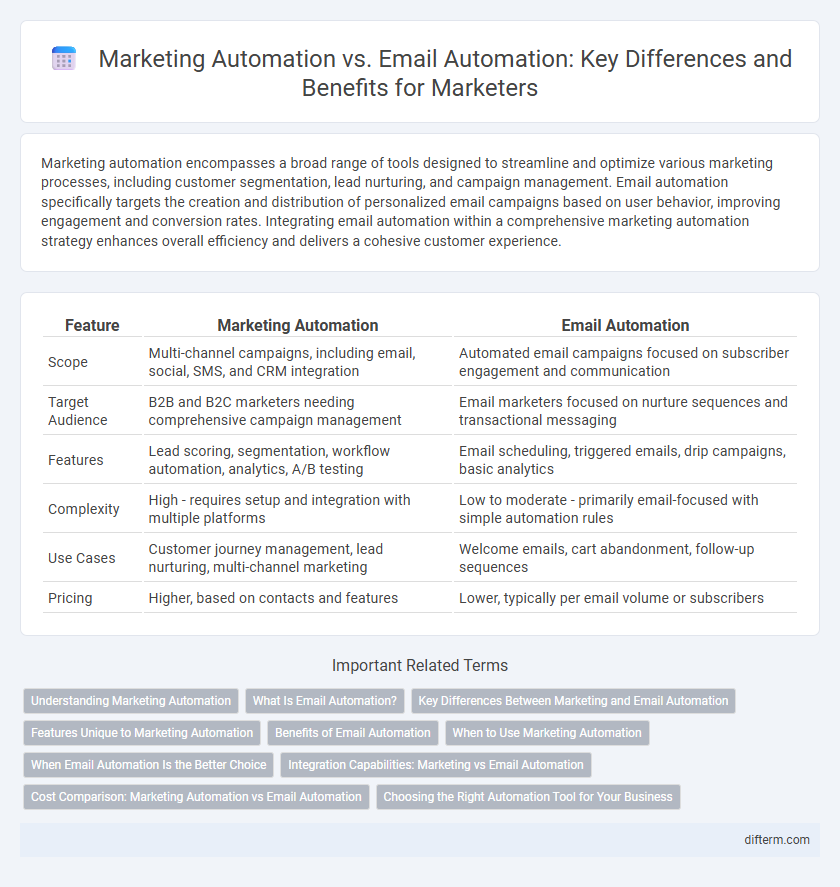Marketing automation encompasses a broad range of tools designed to streamline and optimize various marketing processes, including customer segmentation, lead nurturing, and campaign management. Email automation specifically targets the creation and distribution of personalized email campaigns based on user behavior, improving engagement and conversion rates. Integrating email automation within a comprehensive marketing automation strategy enhances overall efficiency and delivers a cohesive customer experience.
Table of Comparison
| Feature | Marketing Automation | Email Automation |
|---|---|---|
| Scope | Multi-channel campaigns, including email, social, SMS, and CRM integration | Automated email campaigns focused on subscriber engagement and communication |
| Target Audience | B2B and B2C marketers needing comprehensive campaign management | Email marketers focused on nurture sequences and transactional messaging |
| Features | Lead scoring, segmentation, workflow automation, analytics, A/B testing | Email scheduling, triggered emails, drip campaigns, basic analytics |
| Complexity | High - requires setup and integration with multiple platforms | Low to moderate - primarily email-focused with simple automation rules |
| Use Cases | Customer journey management, lead nurturing, multi-channel marketing | Welcome emails, cart abandonment, follow-up sequences |
| Pricing | Higher, based on contacts and features | Lower, typically per email volume or subscribers |
Understanding Marketing Automation
Marketing automation streamlines complex, multi-channel campaigns by integrating email, social media, and CRM systems, enhancing lead nurturing and customer segmentation beyond traditional email automation. It enables personalized customer journeys through behavioral data analysis and triggered actions, improving conversion rates and ROI. Unlike email automation, which focuses solely on scheduled email sequences, marketing automation orchestrates comprehensive strategies that align sales and marketing efforts.
What Is Email Automation?
Email automation is a marketing technology that enables businesses to send targeted, personalized messages to their audience based on user behavior, preferences, and engagement triggers. It streamlines repetitive email campaigns such as welcome series, abandoned cart reminders, and event invitations, improving customer retention and conversion rates. By integrating with customer relationship management (CRM) systems, email automation enhances lead nurturing and optimizes communication timing for higher ROI.
Key Differences Between Marketing and Email Automation
Marketing automation encompasses a broader range of processes, including customer segmentation, campaign management, and lead nurturing, while email automation specifically targets automated email campaigns and personalized messaging. Marketing automation integrates multiple channels such as social media, SMS, and web interactions, whereas email automation is confined to optimizing and scheduling email workflows. Key differences include scope, channel integration, and the complexity of customer journey mapping, with marketing automation providing more comprehensive tools for multi-channel engagement.
Features Unique to Marketing Automation
Marketing automation encompasses a broader range of functions beyond email campaigns, including lead scoring, customer segmentation, multi-channel campaign management, and advanced analytics. It integrates CRM data, enabling personalized workflows and customer journey mapping that adapt based on behavior across email, social media, and websites. Unique features like AI-driven predictive analytics and dynamic content personalization optimize marketing strategies at scale, distinguishing marketing automation from simple email automation tools.
Benefits of Email Automation
Email automation enhances marketing efficiency by delivering personalized messages at scale, increasing engagement through timely, relevant content. It reduces manual workload, allowing marketers to focus on strategy while ensuring consistent communication with leads and customers. Automated email campaigns improve conversion rates by targeting users based on behavior and preferences, driving higher ROI.
When to Use Marketing Automation
Use marketing automation when managing complex customer journeys that involve multi-channel campaigns, lead scoring, and behavioral tracking to deliver personalized experiences at scale. Marketing automation platforms integrate CRM data and real-time analytics, enabling targeted segmentation and nurturing through various touchpoints beyond email, such as social media, SMS, and web interactions. Deploy marketing automation for long-term relationship building and revenue growth by automating workflows that adapt to customer lifecycle stages for maximum engagement and conversion.
When Email Automation Is the Better Choice
Email automation is the better choice when targeting personalized customer engagement through tailored email sequences and nurturing leads with behavior-triggered messages. It excels in delivering timely promotions, follow-ups, and onboarding workflows that require precise timing and segmentation. Marketing automation, while broader in scope, may not offer the same depth of customization and direct response in email communication strategies.
Integration Capabilities: Marketing vs Email Automation
Marketing automation platforms offer robust integration capabilities with CRM systems, social media channels, and analytics tools, enabling seamless data flow and unified campaign management. Email automation tools typically provide more limited integration options, primarily focusing on connecting with email service providers and basic customer databases. The expanded integration capabilities of marketing automation enhance personalized customer journeys and real-time multichannel engagement, outperforming standalone email automation solutions.
Cost Comparison: Marketing Automation vs Email Automation
Marketing automation platforms typically involve higher upfront and ongoing costs due to their comprehensive features like lead scoring, multi-channel campaign management, and analytics. Email automation tools are generally more cost-effective, focusing primarily on email campaign scheduling, personalization, and list segmentation. Businesses with limited budgets often prefer email automation for its affordability, while larger organizations invest in marketing automation for broader functionalities despite the increased expense.
Choosing the Right Automation Tool for Your Business
Marketing automation encompasses a broader range of tools that streamline various marketing tasks such as lead nurturing, social media scheduling, and customer segmentation, while email automation specifically focuses on designing and sending targeted email campaigns. Choosing the right automation tool depends on your business goals, budget, and the complexity of your marketing strategy; businesses aiming for multi-channel engagement benefit from comprehensive marketing automation platforms like HubSpot or Marketo. Companies primarily focused on personalized email communication may prefer dedicated email automation solutions such as Mailchimp or ActiveCampaign for their ease of use and cost efficiency.
Marketing Automation vs Email Automation Infographic

 difterm.com
difterm.com